The 18 Best Books for College Students to Read Before Graduating

In the spring of 2017, I launched Nat Chat to share the stories of college students and recent graduates who had gone non-traditional routes. Young people who had pursued entrepreneurship, art, self-education, long-term travel, and other exciting lifestyles not obvious to the typical college student.
One theme that keeps coming up in the interviews is books that made a huge impact on these college graduates and students and gave them the motivation or tools to pursue these new lines of work.
They’re not the typical books you’ll get recommended by your professor or for your summer reading, and they might not have been best-sellers or on the New York Times list. But each one of them has helped someone change their thinking and the direction of their life in an important way.
Now that I’ve released over 30 of these interviews, these are 18 of the must-read books that have stood out as being the best for college students, high school students, and any young adult trying to take more control of their life.
The 4-Hour Workweek by Tim Ferriss

Get it on Amazon. Read my notes.
Recommended in my episodes with Taylor Pearson, Scott Britton, and Justin Mares.
The 4-Hour Workweek has been a defining book for the last 10 years, showing anyone how anyone can build lifestyle businesses, work for themselves, and travel the world. It remains one of the best books on how to re-think work in the information age, and to break down the intimidating walls of entrepreneurship. It was extremely inspiring to me when I read it in college, and it’s come up time and time again as one of the most impactful books on students who went non-traditional routes.
Mastery by Robert Greene
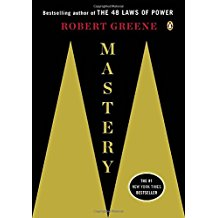
Get it on Amazon. Read my notes. Nat Chat Episode
Recommended in my episodes with Justin Mares, Lucas Miller, and Neil Soni.
Mastery is the best book I’ve found on teaching yourself anything and going from novice to expert in any skill. Greene walks you through the stages of expertise as shown by some of history’s greatest experts, and gives you the step-by-step toolkit you need to take the path to Mastery yourself. If you want an in-depth guide to learning new skills beyond the classroom, this is one of the best books you can find.
The End of Jobs by Taylor Pearson
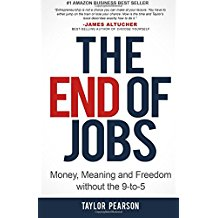
Recommended in my episode with Taylor Pearson.
Taylor Pearson ditched the law school track, ran off to Brazil, became a skilled digital marketer, and traveled the world supporting himself with his new skills. After spending time abroad getting immersed in the new world of world-traveling entrepreneurs and seeing the future of work, he wrote The End of Jobs to describe how our economy is changing and why the old “safe job” model isn’t just unreliable–but downright dangerous. If you still think it’s a safe responsible idea to go work for a big company like your peers, this book will be an eye opener.
Man’s Search for Meaning by Viktor Frankl
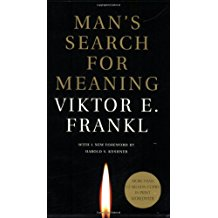
Get it on Amazon. Read my notes.
Recommended in my episodes with Taylor Pearson and Charlie Hoehn.
Viktor Frankl survived a Nazi internment camp during the Holocaust and came out with a new understanding of what drives mankind. His book, Man’s Search for Meaning, has been long revered as one of the most insightful self-help books on what motivates us and how we can find meaning in our own lives. Many people who read it report that it made them re-think what was important to them, and how they can live more in line with their values.
Antifragile by Nassim Nicholas Taleb
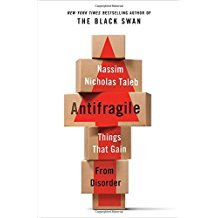
Get it on Amazon. Read my notes. Nat Chat Episode.
Recommended in my episodes with Neil Soni and Aaron Watson.
No book has influenced my thinking more than Antifragile. It gives you a new, compact way to think about so much of the world around you, and completely changes your thinking around what’s risky, what’s safe, and how you can protect yourself from sudden setbacks and breakdowns. It’s a must-read for anyone who wants to be in control of their life.
Principles by Ray Dalio
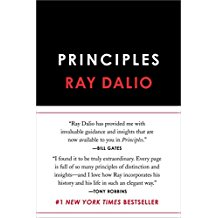
Get it on Amazon. Read my notes.
Recommended in my episodes with Taylor Pearson and Connor Grooms.
I first read Principles when it was a free PDF on the Bridgewater website, and excitedly re-read it when it was released as a standalone book. Dalio provides crystal clear thinking about how to guide your life through good principles, and how we can all use setbacks and failures as feedback to improve the machines of our lives. Even if you don’t run a business or think of yourself as an entrepreneur, the thinking around how to improve your work and life will change how you live.
The Defining Decade by Dr. Meg Jay
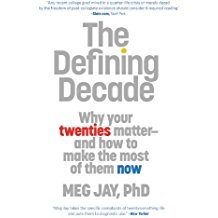
Get it on Amazon. Read my notes.
Recommended in my episodes with Shelcy Joseph and Tasha Meys.
Widely regarded as one of the best books for people in their 20s, the Defining Decade will make you rethink many of the lifestyle choices common for people in their early adulthood. It will help you escape from optimizing for freedom, and make you think more about investing in yourself, your relationships, your career, and your life. If you’ve ever felt like you “don’t know what you’re doing” in your 20s, this book is a must-read.
Recession Proof Graduate by Charlie Hoehn
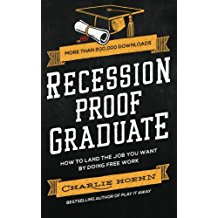
Recommended in my episodes with Charlie Hoehn, Thomas Frank, and Zak Slayback.
It may not be 2008 anymore, but Charlie Hoehn’s guide to making yourself Recession Proof is useful in any economy. He covers how you can develop useful skills and reach out to entrepreneurs to work with them, and leverage those relationships into bigger and more exciting projects. Considering he used these strategies to work for Tim Ferriss, Tucker Max, Ramit Sethi, and many others, he’s a good person to listen to.
The Art of Learning by Josh Waitzkin
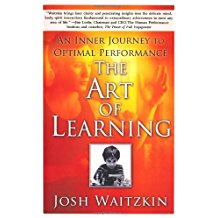
Get it on Amazon. Read my notes.
Recommended in my episode on Mastery and in my episode with Cory Ames.
The Art of Learning is one of the best resources on how you can make yourself a better self-educator. Josh Waitzkin learned to be one of the best chess players, tai chi practitioners, and jiu jitsu competitors in the world, and he’s refined his learning strategy into this guide that anyone can use in their lives.
Letters from a Stoic by Seneca
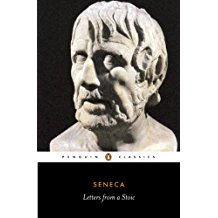
Get it on Amazon. Read my notes. Made You Think Episode.
Recommended in my episode on Mastery and in my episode with Neil Soni.
One of the most popular and widely influential works of philosophy, Letters from a Stoic provides a guide to the good life by helping you realize what’s in your control, what’s out of your control, and what’s worth directing your energy towards. It’s had a huge impact on my own thinking about what to care about in my life and how to live, and many guests have reported the same.
Never Eat Alone by Keith Ferrazzi and Tahl Raz
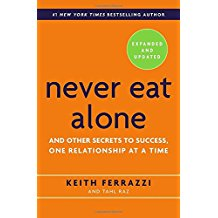
Get it on Amazon. Read my notes.
Recommended in my episode with Scott Britton.
One of the best things you can do for your future success is to start building your network, and Never Eat Alone is the timeless guide to doing it. Even if you’re not in sales, learning to start building relationships with people whose work or life you’re interested in can pay off in unexpected ways, and it’s fun! This was part of the inspiration for starting to do second-degree dinners.
Awaken the Giant Within by Tony Robbins
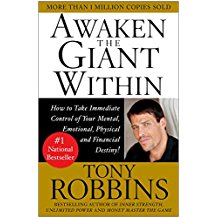
Get it on Amazon. Read my notes.
Recommended in my episodes with Zak Slayback and Tasha Meys.
Awaken the Giant Within has been one of the most popular books on designing your life since it was first published in 1991. There’s no better book to light a fire under your ass to be the best version of yourself that you can be, and it’s loaded with practical exercises to help you define your goals and get your life on a track that you’re passionate about.
Excellent Sheep by William Deresiewicz
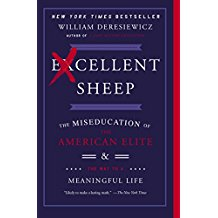
Get it on Amazon. Read my notes.
Recommended in my episode on Mastery and in my episodes with Zak Slayback and Blake Boles. Episode on the book here.
Excellent Sheep is a must-read for anyone who cares about their grades. It brilliantly illustrates how most “top students” are simply high-performing sheep–jumping through the hoops of their parents, peers, schools, and society, and lack the ability to truly think for themselves. If you’re reading this and thinking “I get good grades but I also think for myself and am not jumping through hoops” then definitely read this book.
So Good They Can’t Ignore You by Cal Newport
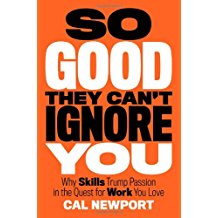
Get it on Amazon. Read my notes.
Recommended in my episodes with Justin Mares and Thomas Frank.
Don’t follow your passion, learn to be so good they can’t ignore you. That’s the advice Cal Newport gives to anyone trying to design their career. Passion arises from developed skills, and most people who are “doing what they love” got there by getting really good at something and becoming more passionate about it over time. They didn’t pick their passion then try to get a job in it. If you’ve been trying to “find your passion,” this book will be a good wakeup call.
Deep Work by Cal Newport
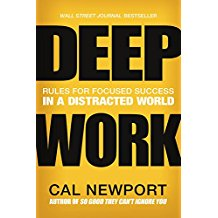
Get it on Amazon. Read my notes.
Recommended in my episode on Mastery and in my episodes with Justin Mares, Thomas Frank, and Zak Slayback.
One of the best books on productivity out there. It explains the concept of “deep work,” how we all need extended periods of uninterrupted concentration, and provides some practical strategies for achieving that peace in the modern world. The lessons from the book are a big part of why I minimize notifications, don’t keep social apps on my phone, and structure parts of my week with no meetings.
Peak by Anders Ericsson and Robert Pool
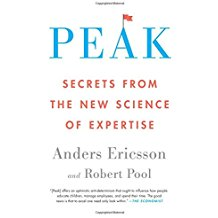
Get it on Amazon. Read my notes.
Recommended in my episode with Justin Mares.
Talent is a myth, and this book shows you why. Ericsson’s research explains where the myth of talent comes from, and how anyone can use deliberate practice to become one of the best in their world at their chosen discipline. With this book and Mastery, you’ll have everything you need to systematically refine your skill set without college.
The Power of Habit by Charles Duhigg
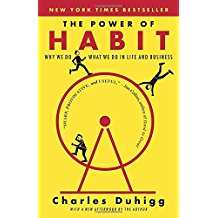
Get it on Amazon. Read my notes.
Recommended in my episode with Lucas Miller.
Power of Habit is the best book to give you an introduction to designing good habits for your life, and breaking bad ones. It changed how I thought about what was in and out of my control when I read it, and I’ve used it for everything from being more productive to waking up earlier to eating better to exercising regularly. At the core is a simple system: cue, routine, reward, that you can use to modify your automatic behaviors and even influence the behaviors of others.
Black Swan by Nassim Nicholas Taleb
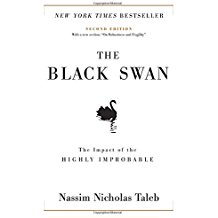
Get it on Amazon. Read my notes.
Recommended in my episode on Antifragile and with Taylor Pearson.
If you want to understand why massive bad (and good) things happen that no one sees coming, Black Swan is your guide. It explains why we fail to predict shocks like the 2008 recession, why trying to avoid forest fires makes them worse, why buildings still fail to survive inclement weather, and why so many of us behave like blissfully ignorant Turkey’s before Thanksgiving. If you don’t want your head on the chopping block next time something big goes wrong, this book will help prepare you.
You certainly don’t have to read all eighteen of the books immediately, but they’re all worth reading at some point. Take a look at which ones’ summaries appeal the most to you, order one or two to start, and keep returning to the list as you work through it.